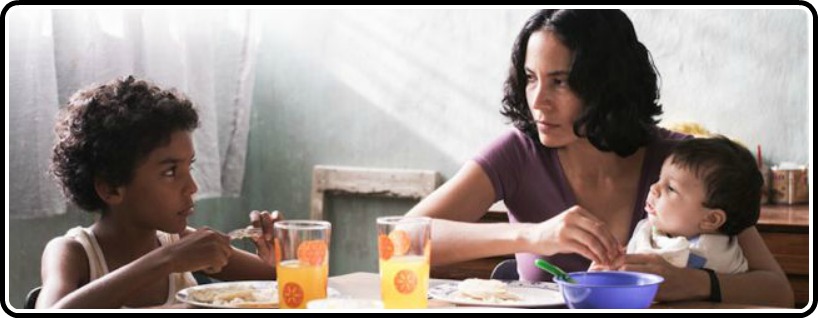Over the span of a year, more than a handful of truly solid, intimate cinematic efforts hit theaters either in a limited release or via the festival circuit, only to be seemingly forgotten. Be it supremely small indie projects from the states or tales of human relationships made outside this country, some of the most interesting and entrancing pictures can be overlooked in what is a bloated landscape of massive blockbusters and prestige festival pictures.
One of these films that should, and will hopefully, find a bigger audience as it makes the rounds is the Venezuelan drama, Bad Hair.
From writer/director Mariana Rondon, the film tells the tale of wild haired young Junior, a youngster who takes his uncontrollably curly mane as a burden, hunting for any and every way to straighten it like his favorite pop singers. With a best friend with a penchant for watching beauty pageants, he decides to make a new school photo his chance to redesign himself. When he attempts to rebrand himself, his mother becomes a rather tough roadblock to leap over for the young boy, unsure of what he truly wants to be. Herself a single mother of two, including a baby boy who Junior becomes jealous of due to the love and affection shown to him, Marta is a tough nosed woman recently suspended from her job as a security guard. With all this stress placed upon her shoulders, and the stress of burgeoning youth on her young son’s, this briskly paced, intimately drawn study of one boy’s sexual awakening and the resulting conflicts both inter and intrapersonally is at times slight, but also deeply touching and engaging.
With its closest and most recent comparison being the Celine Sciamma film Tomboy, the film follows very much in this type of picture’s footsteps. Ostensibly a character study about a boy growing up in a cartoonishly macho society only to discover that he doesn’t fit in, the film’s greatest strenght lies in its central performance. Samuel Lange is an absolute discovery here as Junior, a character that is so sympathetic that it has all the chance in the world to come off as melodramatic but is instead real and raw in a way a more experienced young actor may not have the energy to hit. Opposite him is the equally great Samantha Castillo as Marta, his mother, and the two have an undeniable energy and chemistry together. Their sequences, and performances in general, together are absolutely brimming with vitality and naturalism, and add a great deal of emotional depth to a film that could otherwise come off as nothing more than a preachy, judgemental meditation on a society unwilling to bend to the freedoms of youth and growing sexuality. When a crush becomes clear, one that her son has on a local teen boy, Marta snaps and takes drastic, harsh steps to keep her son away, but not out of disdain so much as fear of a cold, judgmental world. It’s this idea, and an interchange between the two as he is being tucked in, that really lends the film so much heart and realism, all of which turn this into something really superb.
Beautifully shot by Micaela Cajahuaringa, the film carries with it a documentary-esque, neorealist aesthetic both in the performances and in Rondon’s direction. The film never feels like it’s in the same room as any of the characters, instead as if it were simply peering in on their lives. As if their lives weren’t truly anything remarkable so much as just a way of life in a changing world. A truly layered film with an aesthetic that is as interested in just watching what unfolds as it is documenting it in any flashy way, the film does have an occasional flight of fancy, but finds nearly every stylistic thread carried within its DNA firmly rooted in the realm of modern neo-realism. The use of focus here is highly important, particularly in sequences involving interactions between our lead and his distant but very much caring mother, all building this as a densely character-driven piece of cinema. They don’t really quite make these type of pictures anymore, a film that finds ways to make the style into substance, building a universe, and ultimately a sense of style, directly out of the characters that will inhabit this space.
Again, arguably without much truly new to say on the subject given the recent rise of films looking at the topic of homosexual awakening in youth, this film is still very much an entrancing meditation on the isolation brought on by that realisation, and has an aesthetic all its own. One of the more intriguing films seen during this first half of 2014, it is one that will hopefully find an audience as it continues to roll out throughout the country.




![Bergman Island (The Criterion Collection) [Blu-ray]](https://criterioncast.com/wp-content/uploads/2022/11/bergman-island-the-criterion-collection-blu-ray-400x496.jpg)
![This Is Not a Burial, It’s a Resurrection (The Criterion Collection) [Blu-ray]](https://criterioncast.com/wp-content/uploads/2022/11/this-is-not-a-burial-its-a-resurrection-the-criterion-collection-blu-ray-400x496.jpg)
![Lars von Trier's Europe Trilogy (The Criterion Collection) [The Element of Crime/Epidemic/Europa] [Blu-ray]](https://criterioncast.com/wp-content/uploads/2022/11/lars-von-triers-europe-trilogy-the-criterion-collection-the-element-of-400x496.jpg)
![Imitation of Life (The Criterion Collection) [Blu-ray]](https://criterioncast.com/wp-content/uploads/2022/11/imitation-of-life-the-criterion-collection-blu-ray-400x496.jpg)
![The Adventures of Baron Munchausen (The Criterion Collection) [4K UHD]](https://criterioncast.com/wp-content/uploads/2022/11/the-adventures-of-baron-munchausen-the-criterion-collection-4k-uhd-400x496.jpg)
![Cooley High [Criterion Collection] [Blu-ray] [1975]](https://criterioncast.com/wp-content/uploads/2022/11/cooley-high-criterion-collection-blu-ray-1975-400x496.jpg)